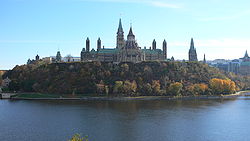John Allen Fraser
Appearance

John Allen Fraser, PC, OC, OBC, CD, QC (December 15, 1931 – April 9, 2024) was a retired Canadian parliamentarian and former Speaker of the House of Commons. He was the first Speaker to be elected by his peers in a secret ballot.
Sourced
[edit]The House Of Commons At Work (1993)
[edit]- On a craggy bluff above the majestic Ottawa River stands the remarkable embodiment of our system of governance: Parliament.
- Preface, p. ix
- " as I became Speaker in 1986, I made a point of setting up a public information office to respond to requests and provide information about Parliament and how it functions."
- Preface, p. ix
- The House Of Commons has never been a tea-party. It consists of strong-minded, often very idealistic people, who are trying to accomplish something for our country. We are inheritors of an adversarial system and that, in itself, fosters conflict.
- Preface, p. xi
- In the long and dogged crusade that the human race has fought in favor of democracy, the ideal of liberty, of freedom, has always been the goal.
- Chapter 1, The System of Government, p. 4
- Democracy is not a form of government. It is a political philosophy that can be embodied in various systems of government.
- Chapter 1, The System of Government, p. 5
- But while the American Constitution was the child of war, ours grew out of discussion, bargaining and negotiation.
- Chapter 1, The System of Government, p. 6
- The very structures, the corridors, the rooms and offices, are eloquent testimony to our past.
- Chapter 2, The Parliament Buildings, p. 28
- The office of Speaker is almost as ancient as Parliament itself. It emerged in the Middle Ages when the Commons - the ordinary people - of England needed a spokesman in their dealings with the King, someone who would voice their grievances and present their petitions. This was by no means a safe or easy thing to do at that time, and potential spokesman generally had to be pressured into accepting the responsibility.
- Chapter 4, The Office of Speaker of the House of Commons, p. 46
- A careful and sympathetic sense of humour can also be a great asset when there is need to get out of difficult situations gracefully.
- Chapter 4, The Office of Speaker of the House of Commons, p. 55
- As our parliamentary system now stands, we say that this role of overseeing the Government has probably become the main function of the House of Commons. the purpose of this function is to illuminate the weaknesses in government policies, the errors that may have been committed and the sectors that may have been forgotten, and to suggest alternative solutions.
- Chapter 9, The House of Commons Functions, p. 122
- Question Period is not part of the legislative process,and has nothing to do with it. It is a means of monitoring the Executive that the Government cannot evade.
- Chapter 9, The House of Commons Functions, p. 122
- Debates must take place in an atmosphere of courtesy.
- Chapter 10, The Business of the House, p. 150
- The purpose of privilege is not to place parliamentarians above the law, but rather to allow them to carry out their duties independently and effectively, in the national interest.
- Chapter 10, The Business of the House, p. 152
- The institutions which our ancestors established to to sustain and defend democracy in this country are still with us today, more than two hundred years later.
- Afterword, p. 172

- For two years now, my office has had the honour and the privilege of sponsoring seminars on the functioning of government in this country for Eastern Europeans. These seminars and exchanges have brought together representatives from such nations as Bulgaria, Hungary, the Czech and Slovak Republic, Roumania, Poland, Russia, Lithuania, Latvia, Estonia and the Ukraine, all of them anxious to learn what makes a society as diverse as Canada work and how our institutions make it governable.
- Afterword, p. 173
- If the institutions of parliamentary democracy are worth preserving, the duty to explain them to the people they are meant to serve becomes vitally important.
- Afterword, p. 174

